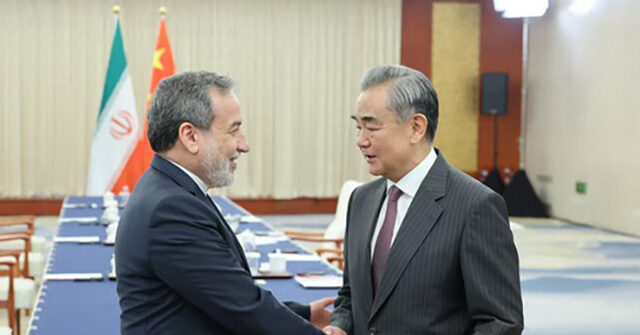Chinese Foreign Minister Wang Yi declared his country’s support for the “national sovereignty and dignity” of Iran after meeting with Iranian Foreign Minister Seyed Abbas Araghchi on Wednesday.
The foreign ministers from the two authoritarian regimes met on the sidelines of the Shanghai Cooperation Organization (SCO) summit in the northern Chinese city of Tianjin. The SCO is technically a regional security block for Central and Southeast Asia, but it has increasingly served as the front lobby for the Chinese-Russian axis of influence.
Wang promised Araghchi that China would “continue to support Iran in safeguarding its national sovereignty and dignity, resisting power politics and bullying, defending its legitimate rights and interests through political negotiation, and adhering to the principle of good-neighborliness and friendship to continuously improve and develop relations with its neighboring countries.”
WATCH — Hegseth: Iran Is Trying to Save Face After Being Decimated by U.S.:
Iran, the world’s worst state sponsor of terrorism and a constant destabilizing force in the Middle East, is no one’s idea of a “good neighbor.” Wang poured on the flattery because China sees an opportunity to build ties with the Islamic Republic after its military was humiliated by Israel and the United States in the 12-Day War.
Araghchi offered “high-level exchanges” and deeper “mutually beneficial cooperation” in return. What China really wants is oil – and Beijing is worried that recent developments in the Middle East are jeopardizing a carefully-planned bid for influence that seemed to be going very well for China during the Biden administration.
Just two years ago, China was crowing that it brokered a rapprochement between regional adversaries Iran and Saudi Arabia, supposedly a diplomatic achievement that heralded China’s emergence on the world stage as a diplomatic titan. Today, China watches helplessly as Iran’s proxy forces lie in ruins and the U.S. is steadily bringing the new Syrian government closer to its orbit, with a few setbacks along the way. The game is far from over, but it does not look as good for Beijing as it did under the previous U.S. administration.
As the European powers who stuck with the Iran nuclear deal after America’s exit grew frustrated by Iran’s cheating, and U.S.-Iran nuclear negotiations went into a deep freeze, China saw a chance to become the Islamic Republic’s best friend.
It was a shrewd and mostly cost-free move for China, which looks for any opportunity to denounce “bullying” from the U.S. or Europe, even when the ostensible victims of the bullying are trying to cook up weapons-grade uranium. China does not have to do much except run cover for Iran at the United Nations Security Council. Araghchi reminded Wang on Wednesday that Iran expects China to keep doing that.
According to Iran’s state-run PressTV, Aragchi “briefed his Chinese counterpart on the latest developments following these aggressions and the cessation of hostilities, emphasizing the responsibility of the U.N. Security Council and all governments to uphold peace and security in the region and the world.”
“China highly values Iran’s commitment not to developing nuclear weapons, respects Iran’s right to the peaceful use of nuclear energy, and appreciates Iran’s pursuit of peace through diplomatic means,” Wang responded.
China might also be looking to bolster its relationship with Iran as a few cracks begin appearing in the “unlimited partnership” between China and Russia. Oleg Ignatov, senior Russia analyst for the Crisis Group, told Al Jazeera News on Wednesday that “North Korea is now a more important ally for Russia than Iran or China.”
Ignatov said Pyongyang developed a closer relationship with Moscow by sending troops to fight in Ukraine and it could be on the verge of sending thousands more.
WATCH — Exclusive: Witkoff Details Path to Peace in Ukraine:
“North Korea supplies Russia with ammunition and some types of heavy weapons. As for the North Korean soldiers, Russian sources say they are professional and disciplined. At the beginning of the Kursk operation, they lacked the modern combat skills required for this type of war, which involves the use of large numbers of drones, but they quickly adapted,” he said.
Rachel Minyoung Lee, a senior fellow with North Korean watchdog group 38 North, said North Korea gained valuable combat experience for its soldiers in Ukraine, plus benefits like military technology, oil, coal, fertilizer, and wheat from Russia.
Lee said this relationship gives North Korea “stronger leverage vis-a-vis China, which could have broader regional implications in the longer term.”
China will not be thrilled by the prospect of a stronger, more assertive North Korea, so it might want to show off its own dangerous protege in Iran. Meanwhile, Russia, China, and Iran sense a joint opportunity to recruit another tiny terror into their axis of authoritarianism: Georgia, which is increasingly disinterested in robust multi-party democracy.
Read the full article here


